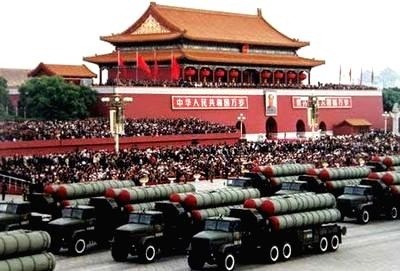On Sept. 3, China will mark the 70th anniversary of the victories in the War of Resistance Against Japanese Aggression (1937-45) and the world anti-fascist war. A military parade in Beijing's Tian'anmen Square will be held, to be attended by President Xi Jinping and other leaders.
Zhou Bo, an honorary fellow with the Center of China-American Defense Relations, Academy of Military Science, PLA, wrote in an article in China Daily that the Sept. 3 parade, as a time-honored tradition, would be "more than a gala for all who suffered and won," but also an occasion aimed to project China as a peace-loving country and the display of its military strength is for keeping peace and not an act of "saber rattling."
According to Zhou, China has risen after fighting wars from 1949 to 1979. He cited that during the Cold War, China had to prepare for confrontations with two superpowers. But China emerged from the turmoil without the use of force against any other country. He added that China yearns to be loved, rather than feared, and from 1980 onward during reforms, China's growth in terms of national strength has made it more benign and predictable.
Zhou further noted that China's rise to power has been peaceful despite serious challenges that could have derailed its path to development and reform. He cited some incidents that would have triggered a war, such as former Taiwan leader Chen Shui-bian's call for referendum on independence in Taiwan, NATO's bombing of the Chinese embassy in the former Yugoslavia, a Chinese aircraft's collision with an American aircraft, among others. He said that China managed to overcome all these with maximum restraint.
Overseas, the Chinese military is more cautious. China sent an infantry battalion for peacekeeping in South Sudan only in 2014, more than 20 years after it sent its first peacekeeping observers abroad.
Zhou wrote that China's invitation to world leaders to come to Beijing for the parade indicates a message that means China wants to join the world in safeguarding the international order. He added that China's attitude has changed in recent years, as it no longer calls for establishing "a new international political and economic order."
Premier Li Keqiang, during his visit to India, has declared that China would like to become the beneficiary and protector of the current international order and international system.
Zhou added that the proof that China can truly help in improving the current international financial system is the warm response of many Western countries to the Asian Infrastructure Investment Bank proposed by China.
Zhou also mentioned the capability of the People's Liberation Army, the largest armed forces in the world, to maintain world order, but he said that the PLA's role is more on helping the world rather than "saving" the world.
According to Zhou, the last thing the PLA wants is to be seen as "world police," but it can help to make the world a safer place.



























